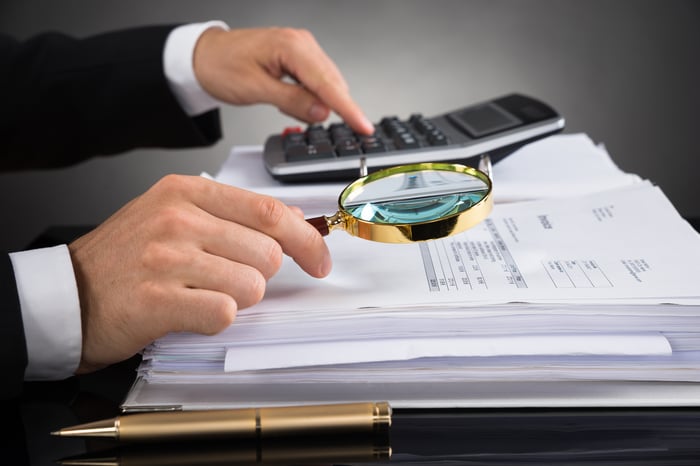Worries about tax audits are on the rise. According to a recent Rasmussen Reports survey, 23% of Americans are at least somewhat concerned about having their taxes audited by the IRS, with 7% being "very concerned." Those numbers are up strongly from 14% and 3%, respectively, a year ago.
A tax audit might indeed be a headache for you, but it's not likely to be much more than that -- and it's not even likely to happen at all. Here are some things you should know about IRS audits.

Image source: Getty Images.
Low odds
Just how "not likely" is it that your tax return will be audited? Check out these numbers:
|
Income |
Percent of Total Returns |
Percent Audited in 2015 |
|---|---|---|
|
All tax returns |
100% |
0.84% |
|
No adjusted gross income (AGI) |
1.76% |
3.78% |
|
$1 to $24,999 |
38.51% |
1.01% |
|
$25,000 to $49,000 |
23.23% |
0.50% |
|
$50,000 to $74,999 |
13.13% |
0.47% |
|
$75,000 to $99,999 |
8.42% |
0.49% |
|
$100,000 to $199,999 |
11.15% |
0.64% |
|
$200,000 to $499,999 |
3.08% |
1.54% |
|
$500,000 to $1 million |
0.48% |
3.81% |
|
$1 million to $5 million |
0.21% |
8.42% |
|
$5 million to $10 million |
0.01% |
19.44% |
|
More than $10 million |
0.01% |
34.69% |
Source: IRS Data Book, 2015
If that's not reassuring enough, know that these low odds are getting even lower, as Congress has been cutting the IRS budget repeatedly in recent years. Don't rejoice about that, though, as reducing IRS funding is not a very sensible thing to do. According to IRS Commissioner John Koskinen in a 2016 speech, relentless budget cuts by Congress have left the IRS less effective, with more than 5,000 fewer people since 2010 "who audit returns and perform collection activities, as well as ... investigate stolen identity refund fraud and other tax-related crimes." He added, "As you might imagine, these staffing losses have translated into a steady decline in the number of individual audits over the past six years. Last year, in fact, we completed the fewest audits in a decade.... That trend line of fewer audits will continue this year." Clearly, if you're wondering, "Will I be audited by the IRS?" -- the answer is most likely, no. In addition, fewer audits mean fewer dollars collected that were due to the government. Per Koskinen, cuts are costing the government between $4 billion and $8 billion, as money due isn't collected: "We are the only agency if you give us more people and money, we give you more money back."

Image source: Pixabay.
Keep your odds of an audit low
Whether you're audited or not isn't simply a matter of chance. There are things you can do that can keep your return from drawing attention and that will decrease your odds of being audited. For example:
- Be neat: If the IRS can't decipher your handwriting or your return is sloppy, your return might be flagged for a closer look.
- Don't make mistakes: Your numbers all need to add up. In tax returns filed in 2013, the IRS reported that there were close to 2.3 million math errors, resulting in massive numbers of notices sent to taxpayers about them. Using tax-preparation software can keep math errors to a minimum.
- Be complete. Report all income, from salaries, interest, dividends, and so on. The IRS will likely have received the information you're sent on various 1099 and 1098 forms from the financial services companies you use, and it will be looking to make sure that all the income it's aware of is on your return.
Failing to file a return or having no income will also draw the attention of the IRS. Even if you don't owe any taxes, you need to file a return showing that you don't. And if you're stating that you have no income, the IRS might question that. In 2014, about 5.3% of returns with no income were audited.
Even if you're as careful and complete as you can be, your odds of being audited may still be above average. That will be the case if your income is on the steep side, and it will be the case if you're self-employed, too. Returns with deductions of unusual size (such as for charitable donations or business expenses) can also trigger audits. You can minimize the headache of a possible future audit by keeping good records of all your income and tax-related expenses so that you can . Keep several years' worth of bank statements, check registers, and credit card bills.

Image source: Getty Images.
If an audit happens
So what if your fears come to pass and you're audited? Well, it probably won't be as terrible as you expect. Most audits are relatively small matters, and about 73% of audits are conducted through the mail, not by requiring you to sit across a desk from an IRS agent at the IRS office or at your place of business.
Audits can seem scary but they're not usually a problem if you've been honest. You'll be asked about some part of your return -- perhaps a questionable deduction -- and will be expected to provide documentation to support it. Audits are not typically about going through your entire return, line by line. If you have your returns prepared by a professional, he or she may be able to deal with the IRS for you. Enrolled agents, for example, are authorized to do so.
Don't let the fear of a tax audit keep you up at night. It's extremely unlikely to happen, and if it does, it probably won't be a big deal.




